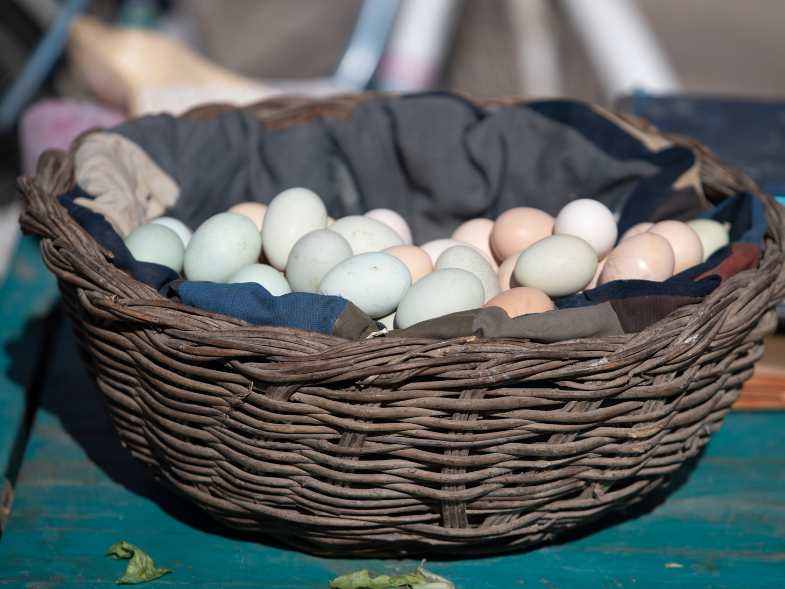Domesticated ducks provide backyard beauty, family companionship, and delicious eggs for the breakfast table.
While it’s pretty easy to discern the females from male ducks, it’s much harder to know when a female duck will start laying eggs. It’s not a question of “how old are ducks when they start laying eggs?” but rather a question of the right conditions for a duck to lay eggs as well as their age and time of year.
Below, we’re covering everything about when ducks begin laying eggs and the tell-tale signs that it’s time. We’ll also go over strategies to help ducks lay and how duck mating plays into all of this.
When Do Ducks Begin Laying Eggs?
Let’s answer some of the most common questions about when ducks produce eggs, including how old ducks are when they start laying eggs, the time of year when ducks lay them, and how long the egg-laying process actually is.
Ducks are typically between four to seven months old when they start laying, which is a standard range for most breeds.
While most ducks will start producing eggs in the springtime, they are unlikely to lay their first eggs if they are maturing during fall or winter unless you can provide them with more sunlight. Some breeds, however, like the khaki campbell, lay eggs all year long.
The actual egg-laying process is quick and it doesn’t take long at all for a duck to lay an egg, though it typically happens early in the morning, so you will likely miss the action.
When is a Duck Ready to Lay?
Beyond knowing about how old female ducks typically are when they start laying eggs and the time of year when they usually lay them (spring), there are a few tell-tale signs you’ll want to keep an eye out for that can tell you when a duck is about to start producing eggs.
Look for these signs in this order of appearance:
Nest Site Selection and Building
When a duck is about to begin the laying process, she’s going to want to secure a good spot where she can build her nest and keep her eggs safe.
You may notice her searching for a good spot in your yard where she will be protected from outside elements. Depending on the breed of duck, they will either make their nest on high ground, over water, or in a hidden cavity.
You may also notice her gathering sticks, branches, straw, or debris to build her nest. She may spend time going back and forth between building the nest and collecting materials for it.
Increased Nesting Time
If your bird is spending more time than usual nesting, this is a sign that she is close to laying her first egg.
As she nests, she’ll place her body over the area and adjust her brood spot (a bare spot on her belly) to cover each egg as it comes out. This brood patch is warmer than most areas, thanks to extra blood vessels, so it directly warms the eggs after they emerge.
The Finger Test for Pelvic Bones
If you want to know for sure that your duck can lay eggs and will start laying soon, you can use the finger test to see how far apart their pelvic muscles are.
A female egg’s pelvic bones are typically about two inches apart, but as they prepare to lay their first eggs, the bones will spread apart, allowing three to four fingers to fit between the bones.
This is the most popular and easiest way to tell if your female ducks are maturing and preparing to lay eggs, and it’s founded in real science.
How to Get Ducks to Lay Eggs
If you’re anxious for your ducks to start laying eggs and you want to know how to get ducks to produce them successfully, there are a few things you can provide them with:
- Daily Light – Ample daily light is imperative for ducks to lay, and it’s why most of them won’t produce eggs if they start to mature in the fall or winter. They need at least 14 hours a day of lighting, which might mean you need to purchase an artificial lighting device to provide additional lighting.
- Balanced Diet – A healthy, well-rounded diet will also enhance their egg-laying abilities. Try feeding them duck pellets with a combination of minerals, vitamins, and niacin to give their bodies what they need.
- Environmental Wellness – Environmental factors also impact egg production, particularly their freedom to forage and exercise. You’ll want to ensure they have plenty of space to roam and fly and provide ready access to drinking water.
If you integrate all of these strategies into your flock-raising process, you’re sure to see your ducks start laying more eggs.
When Do Ducks Start Mating?
Ducks usually begin mating at around four months old and in the springtime. However, it’s important to note that mating has nothing to do with egg-laying. Most female ducks will lay eggs regardless of whether they’ve mated with a drake recently.
If you’re interested in raising ducklings of your own, you may wonder how long after mating do ducks lay eggs? If you’re just curious about how long it takes for a duck to lay a brood of ducklings rather than eggs, the answer is about 10-18 days. During that window, the female’s eggs will be fertile. After that window, they will go back to being just regular eggs.
Laying Duck Eggs – The Wrap Up
Now that we’ve answered the question “How old are ducks when they start laying eggs?” you know what to expect down the road when you get a flock of ducklings.
We’ve also gone into the details of the egg-laying order of events and some strategies to tell if your female ducks are ready to produce eggs.
Now, you’re ready to start supporting your flock as they move into maturity and begin laying a fresh batch of eggs.

